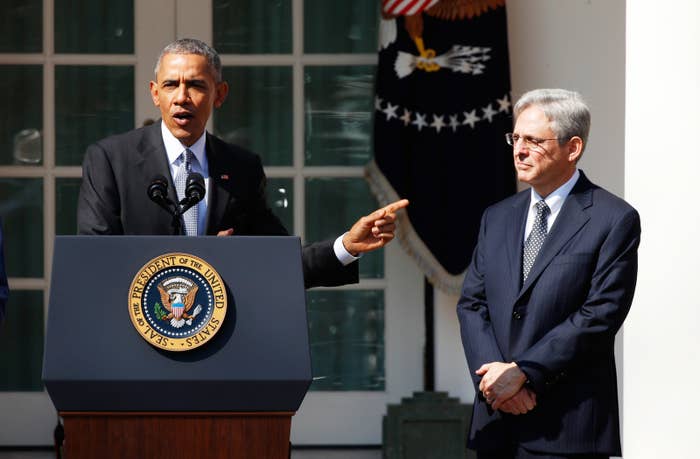
Judge Merrick Garland will not be joining the US Supreme Court after months of Senate inaction on the nomination. Instead, in January, he has decided to resume hearing cases in the federal appeals court on which he already sits in Washington, DC.
The move back to the bench at the US Court of Appeals for the DC Circuit will end a 10-month hiatus from hearing cases while his ultimately unsuccessful nomination to the U.S. Supreme Court was pending.
Garland — the chief judge of the DC Circuit — stopped handling cases in the federal appeals court after he was nominated in March to fill the late Justice Antonin Scalia’s seat, a practice common among Supreme Court nominees. Garland will be back on the DC Circuit bench to hear arguments on Jan. 18, though, according to the court’s calendar.
Garland’s nomination to the high court technically is still pending, but the Senate recessed for the year on Friday, ending any chance he would have had of a hearing or a vote. Garland’s nomination, as well as those of President Obama’s other judicial nominees, will be sent back to the White House at the start of the new year.
At the annual Hanukkah reception at the White House on Dec. 14, Garland was one of the president's guests, along with justices Ruth Bader Ginsburg and Stephen Breyer. Obama called Garland "one of the country’s finest jurists," and, in a nod to his failed nomination, said that Garland would "continue to serve our country with distinction as the chief judge on the DC Circuit."
Garland's assignment to the calendar for January appears to signal that he, too, understands that his Supreme Court nomination fight is over. It is up to him to decide when to start hearing cases again. Garland was not immediately available to comment.
President-elect Donald Trump is gearing up to fill Scalia's seat in the new year. During the campaign he released a short list of potential nominees, and incoming chief of staff Reince Priebus said in a recent interview that Trump would be interviewing candidates soon.
According to the appeals court, Garland will be resuming all of his normal activities as a judge and as the chief judge of the court, a job that comes with other administrative responsibilities. As of this past week, he was still not participating in any cases; a court representative was not immediately available to comment on whether Garland would act on cases during the rest of December.
Senate Republicans opposed Garland’s nomination even before he became the nominee, arguing more broadly that Scalia’s seat shouldn’t be filled in an election year, and that the next president should pick the nominee. Garland never appeared for a hearing before the Senate Judiciary Committee — although he did submit a questionnaire to the committee.
While he was waiting, Garland did perform some of his administrative duties as chief judge, although he stopped handling judicial misconduct matters. He made the occasional public appearance to talk to lawyers and students, but never addressed the political controversy surrounding his nomination.
The first set of cases on Garland’s docket in January includes a fight over how much access the public should have to records in a court battle over the federal government’s designation of insurance giant MetLife as a "systemically important financial institution," a designation commonly referred to as "too big to fail" that triggers heightened government oversight and regulation. An advocacy group is challenging the judge’s decision to seal part of the record in that case.
Garland will also hear a labor case and a case alleging negligent treatment of a child who was in the District of Columbia’s custody.
